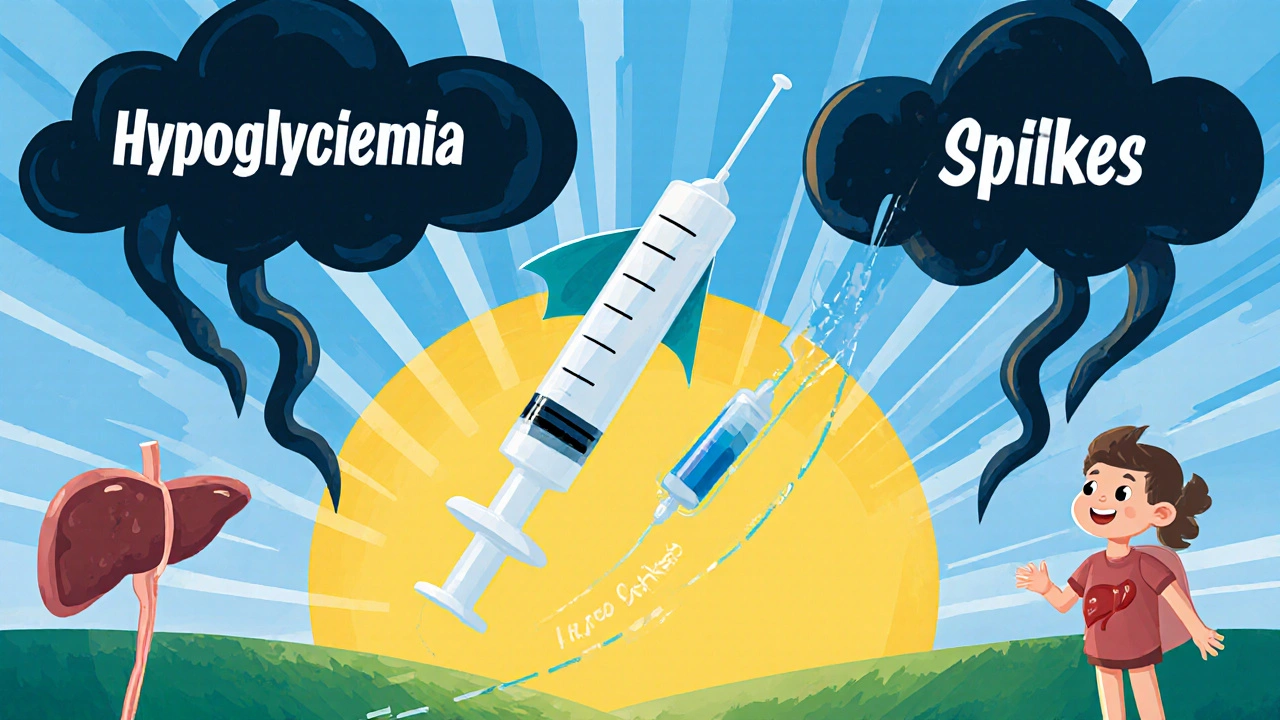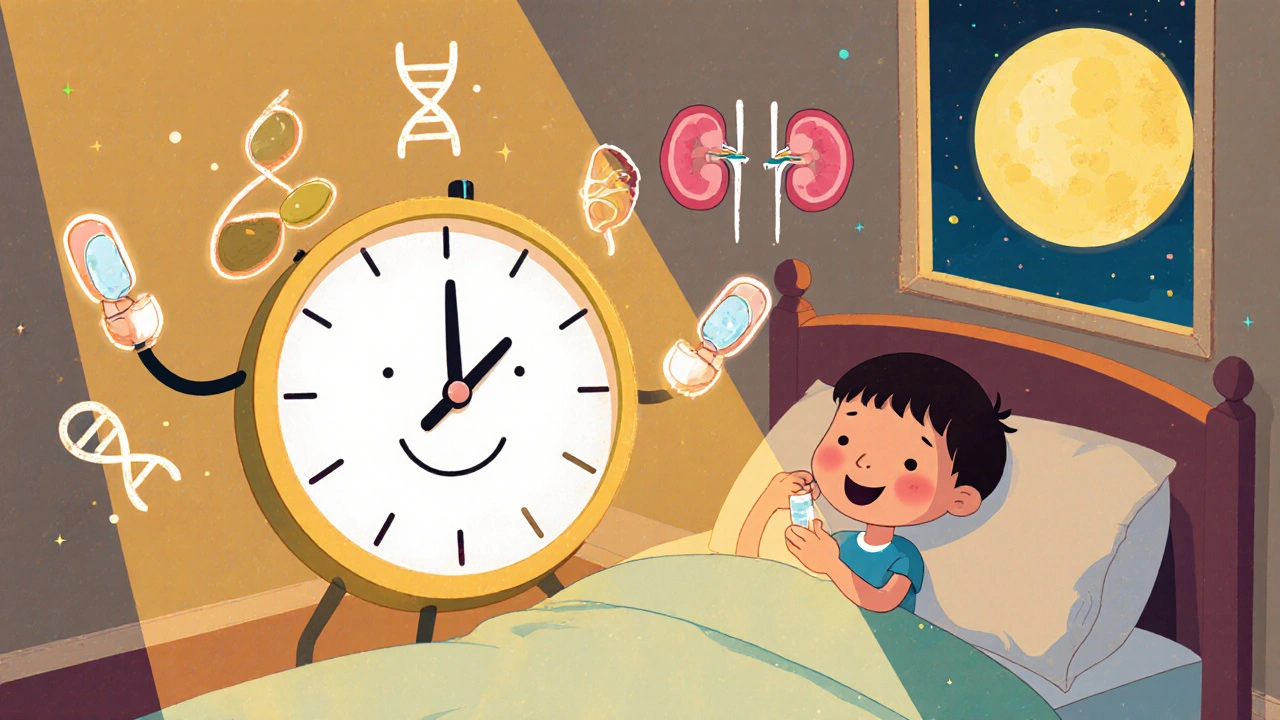Medication Timing Calculator
Select your medication to see optimal timing, potential side effects if timed incorrectly, and risk level.
Recommended Timing
Potential side effects if timed incorrectly:
- Hypoglycemia (low blood sugar)
- Increased risk of severe complications
What if the time you take your medication could make the difference between feeling fine and ending up in the hospital? It’s not a myth. For many drugs, medication timing isn’t just a suggestion-it’s a safety rule. Taking a pill 30 minutes early or an hour late might seem harmless, but for some medications, that small shift can trigger serious side effects-or make the drug useless.
Why Timing Matters More Than You Think
Your body doesn’t run on a 9-to-5 schedule. It runs on a 24-hour clock. Every cell in your body has a biological rhythm that affects how drugs are absorbed, processed, and cleared. Liver enzymes that break down medications spike at night. Kidneys filter more efficiently in the morning. Blood pressure naturally dips while you sleep and rises before you wake up. When you take a drug, it doesn’t just hit your system-it hits a moving target. This is called chronotherapy: adjusting when you take medicine to match your body’s natural cycles. It’s not new. The idea was first explored in the 1970s, but only in the last 15 years have we seen hard data proving it works. A 2013 review found that 66% of studies showed better results when timing was optimized. That’s not a small win-it’s a game-changer for safety and effectiveness.Drugs That Need Exact Timing
Not all medications care if you take them at 7 a.m. or 9 a.m. But some? They’re picky. Here’s where timing is non-negotiable:- Insulin: Mistimed doses cause hypoglycemia in 22% of cases. Taking rapid-acting insulin too early before a meal? You risk crashing. Too late? Blood sugar spikes dangerously.
- Anticoagulants (like warfarin): A timing error can increase bleeding risk by up to 37%. These drugs have a narrow safety window. Even a 2-hour delay can throw off your INR levels.
- Chemotherapy agents: Deviating more than 30 minutes from the scheduled time can reduce effectiveness by 15-20%. Tumor cells divide at specific times, and chemo works best when it hits them at their most vulnerable.
- Morphine for cancer pain: Some patients need doses within a 10-15 minute window. Outside that, pain control drops fast, and side effects like nausea or dizziness climb.
Drugs That Work Better at Night
Some medications don’t just tolerate nighttime dosing-they work better. Here’s the science:- Statins: Cholesterol production peaks between midnight and 4 a.m. Taking statins like atorvastatin or simvastatin at night boosts LDL reduction by 15-20% compared to morning doses.
- ACE inhibitors (for high blood pressure): The MAPEC study showed bedtime dosing reduced cardiovascular events by 29%. Why? Blood pressure doesn’t dip enough at night in many patients. Taking these drugs at night helps restore the natural rhythm.
- Beta-blockers: In cardiac surgery patients, strict evening dosing cut post-op atrial fibrillation by nearly 40%.

Why People Get It Wrong
You’d think this would be simple. Take your pill at the same time every day. But real life gets in the way. A survey of 1,200 patients found 68% couldn’t stick to a consistent schedule for chronotherapeutic drugs. Why? Three big reasons:- Low health literacy: 74% of non-adherent patients didn’t understand why timing mattered. They thought, “It’s just a pill-when I take it doesn’t change anything.”
- Work and life schedules: 52% of caregivers said job shifts, childcare, or travel made timing impossible. A nurse working night shifts can’t take a morning pill at 8 a.m. if they’re asleep until 3 p.m.
- System failures: In hospitals, interruptions during medication rounds are the biggest culprit. One study found that five interruptions during a med pass made errors “almost certain.” Nurses reported being lucky to get within 30 minutes of the right time.
How to Get It Right
You don’t need a PhD to get medication timing right. Here’s how to do it:- Ask your pharmacist or doctor: Don’t assume all pills work the same. Ask: “Is there a best time to take this?” If they don’t know, push for a clear answer.
- Use alarms: Set two alarms-one 15 minutes before and one at the exact time. This gives you buffer time if you’re running late.
- Track it: Use a simple app or paper log. Note the time you took each dose. After a week, look for patterns. Did you miss doses because you were at work? At the gym? Adjust your schedule around those blocks.
- Know your high-risk meds: If you take insulin, blood thinners, or chemo, treat timing like a medical emergency. No exceptions.
- Use pill organizers with time labels: Not just “AM/PM.” Label them “7 a.m.,” “8 p.m.,” etc. Visual cues work better than memory.

The Bigger Picture: Why This Isn’t Just About You
This isn’t just a personal habit. It’s a public health issue. The World Health Organization says timing errors contribute to 6.5% of all adverse drug events worldwide. That’s millions of avoidable hospital visits every year. Hospitals are starting to catch on. Epic’s ChronoCare module, launched in 2023, now flags timing risks in electronic records. The FDA has increased its focus on chronopharmacology, reviewing timing data in 17 new drug applications in 2022-up from just 3 in 2018. The American College of Clinical Pharmacy officially endorsed chronotherapy in 2022. But the biggest barrier isn’t technology. It’s awareness. Most primary care doctors still don’t talk about timing. Community hospitals lag behind academic centers by a factor of three in implementing protocols. The future? Personalized timing based on your genes. The ChronoGene study, wrapping up in late 2024, is testing whether variations in your circadian clock genes determine the best time for your meds. Imagine a blood test that tells you: “Take your blood pressure pill at 10 p.m., not 8 p.m.” That’s not sci-fi-it’s coming.What You Can Do Today
You don’t have to wait for the future to protect yourself. Start now:- Check your most important meds. Are they on the high-risk list?
- Call your pharmacy. Ask if your meds have a recommended time.
- Set a phone alarm for your next dose. Even if it’s just for the next week.
- If you’re a caregiver, write down the exact time each med should be given. Stick to it.
Does the time I take my medication really affect side effects?
Yes, for many medications. Your body’s circadian rhythm affects how drugs are absorbed, metabolized, and cleared. Taking a drug at the wrong time can increase side effects or reduce effectiveness. For example, taking statins at night boosts cholesterol-lowering effects by 15-20%, while mistimed insulin can cause dangerous low blood sugar.
What are the most critical medications to time correctly?
Insulin, anticoagulants like warfarin, chemotherapy drugs, and certain pain medications like morphine require strict timing. Even small delays or advances can lead to serious side effects-hypoglycemia, bleeding, reduced cancer control, or uncontrolled pain. Always confirm the recommended time with your provider.
Can I take my pills at a different time if I miss the window?
It depends. For routine meds like blood pressure pills, being an hour late is usually fine. For high-risk drugs like insulin or blood thinners, don’t guess. Call your doctor or pharmacist. Never double up unless instructed. A 30-minute delay in chemo can reduce its effectiveness, but a 2-hour delay in a statin may only slightly reduce its benefit.
Why do some drugs work better at night?
Your body’s internal clock controls biological processes like enzyme activity, hormone release, and organ function. Cholesterol production peaks at night, so statins taken at bedtime work better. Blood pressure naturally dips during sleep, so taking ACE inhibitors at night helps restore healthy rhythm and reduces heart events by up to 29%.
How can I remember to take my meds at the right time?
Use alarms on your phone, pill organizers labeled with exact times, or simple paper logs. Set two alarms: one 15 minutes before and one at the scheduled time. If you have trouble sticking to a routine, talk to your doctor about simplifying your schedule-maybe combining pills or shifting doses to fit your lifestyle.


This is all government mind control. They want you to take pills at exact times so the chips in your blood can sync with the satellites. You think it's about your liver? Nah. It's about tracking your circadian rhythm so they can predict when you're vulnerable. Wake up, sheeple.
Look, I get it - biology’s a clock, right? But let’s be real. Most of us aren’t lab rats in a controlled environment. I work swing shifts, I’ve got two kids, and my cat knocks my pill organizer off the counter every morning. The idea that timing matters ‘this much’ sounds cool on paper, but in real life? It’s just another way to make people feel guilty for being human. Maybe we need to fix the system instead of blaming the patient.
OMG YES. I’ve been saying this for YEARS. 🙌 I take my lisinopril at 8 p.m. sharp - my doctor didn’t even know it was better at night until I showed him the MAPEC study. Now he’s like, ‘Wow, you’re a legend.’ 😎 And I’m not even a nurse. Just someone who reads. Seriously, if your doctor doesn’t know this, find a new one.
It is both intellectually and clinically indefensible to dismiss the paradigm of chronopharmacology as anecdotal. The peer-reviewed literature, spanning over four decades, demonstrates unequivocally that pharmacokinetic and pharmacodynamic variables are circadian-dependent. To suggest otherwise is not merely ignorant - it is a dereliction of professional responsibility.
Wait - did you just say ‘mistimed insulin can cause hypoglycemia’? Yes. And? You’re not even mentioning the fact that people with type 1 diabetes are dying because their doctors don’t care enough to explain this? This article is good - but it’s not enough. We need mandatory education. Like, now. Before someone else dies because they thought ‘it’s just a pill.’
Ugh. I take my statin at 7 a.m. because I’m already up making coffee. If it’s 15% less effective? So what. I’m not gonna rearrange my whole life for a percentage. 😑
This is so true. In India, most people don’t even know what 'chronotherapy' means. My uncle took his blood pressure meds after dinner - even though he was told to take them in the morning. He had a stroke last year. Now he takes them at night. His BP is better. Simple stuff, but nobody tells you.
My nurse told me to take my warfarin at 6 p.m. I did. My INR stayed perfect for 18 months. I didn’t even know why - just followed instructions. Turns out, it’s science. 🤯
I’m a caregiver for my mom with Alzheimer’s, and let me tell you - timing isn’t just important, it’s a full-time job. We use a pill box with alarms, color-coded labels, and a whiteboard that says ‘INSULIN 7:15 a.m.’ in giant letters. We’ve had zero ER trips since we started. It’s exhausting, but it works. And if you think it’s ‘too much work,’ ask yourself: how much is your loved one’s life worth? 💪
Statins at night? I’ve been doing that for 10 years. Never read a study. Just figured it out because I was tired in the morning and didn’t want to crash. Guess I’m a genius.
Chronotherapy is fascinating, but let’s not romanticize it. The real issue is that pharmaceutical companies don’t invest in timing studies because they can’t patent a time of day. It’s not about biology - it’s about profit. The FDA’s recent push? PR stunt. They’ll still approve drugs with no timing data if the ROI is high enough.
Let’s cut the fluff. This isn’t ‘bio-rhythms’ - it’s a systemic failure of medical education. Doctors are trained to prescribe, not to contextualize. And hospitals? They’re factories. Nurses are rushed. Patients are handed scripts like fast food. This isn’t medicine - it’s assembly-line trauma. And now you want me to believe a phone alarm fixes this? Pathetic.
Y’all are acting like this is some deep secret. Nah. It’s basic. My oncologist literally said, ‘If you’re 45 minutes late on chemo, you’re basically giving your tumor a vacation.’ I’ve got a whole spreadsheet. I even set a damn TikTok reminder. If you’re not doing this, you’re not trying. Period. 💅
Wait - are you telling me the government is using our medication timing to control our sleep patterns? And what about 5G? Are they syncing our pills to cell towers? I’ve been taking my blood pressure meds at 8 p.m. since 2018… I think I’ve been targeted. Someone help me.
My dad’s on warfarin. We started using a pill box with time labels. No more guessing. No more panic calls to the pharmacy. Simple. Human. Effective. Thanks for the reminder that small things matter.